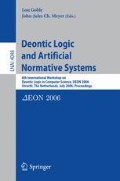Abstract
The action language \({\mathcal{C}}+\) of Giunchiglia, Lee, Lifschitz, McCain, and Turner is a formalism for specifying and reasoning about the effects of actions and the persistence (‘inertia’) of facts over time. An ‘action description’ in \({\mathcal{C}}+\) defines a labelled transition system of a certain kind. \(n{\mathcal{C}}+\) (formerly known as \(({\mathcal{C}}+)^{++}\)) is an extended form of \({\mathcal{C}}+\) designed for representing normative and institutional aspects of (human or computer) societies. The deontic component of \(n{\mathcal{C}}+\) provides a means of specifying the permitted (acceptable, legal) states of a transition system and its permitted (acceptable, legal) transitions. We present this component of \(n{\mathcal{C}}+\), motivating its details with reference to some small illustrative examples.
Access this chapter
Tax calculation will be finalised at checkout
Purchases are for personal use only
Preview
Unable to display preview. Download preview PDF.
References
Giunchiglia, E., Lee, J., Lifschitz, V., McCain, N., Turner, H.: Nonmonotonic causal theories. Artificial Intelligence 153, 49–104 (2004)
Akman, V., Erdoğan, S.T., Lee, J., Lifschitz, V., Turner, H.: Representing the Zoo World and the Traffic World in the language of the Causal Calculator. Artificial Intelligence 153, 105–140 (2004)
Artikis, A., Sergot, M.J., Pitt, J.: Specifying Electronic Societies with the Causal Calculator. In: Giunchiglia, F., Odell, J.J., Weiss, G. (eds.) AOSE 2002. LNCS, vol. 2585, pp. 1–15. Springer, Heidelberg (2003)
Artikis, A., Sergot, M.J., Pitt, J.: An executable specification of an argumentation protocol. In: Proc. 9th International Conference on Artificial Intelligence and Law (ICAIL 2003), pp. 1–11. ACM Press, Edinburgh (2003)
Sergot, M.: (C + ) + + : An action language for modelling norms and institutions. Technical Report 2004/8, Dept. of Computing, Imperial College, London (2004)
Sergot, M.J.: Modelling unreliable and untrustworthy agent behaviour. In: Dunin-Keplicz, B., Jankowski, A., Skowron, A., Szczuka, M. (eds.) Monitoring, Security, and Rescue Techniques in Multiagent Systems. Advances in Soft Computing, pp. 161–178. Springer, Heidelberg (2005)
Lomuscio, A., Sergot, M.J.: Deontic interpreted systems. Studia Logica 75(1), 63–92 (2003)
Lomuscio, A., Sergot, M.J.: A formalisation of violation, error recovery, and enforcement in the bit transmission problem. J. of Applied Logic 2, 93–116 (2004)
Meyer, J.J.C.: A different approach to deontic logic: Deontic logic viewed as a variant of dynamic logic. Notre Dame J. of Formal Logic 29(1), 109–136 (1988)
Maibaum, T.: Temporal Reasoning over Deontic Specifications. In: Meyer, J.J.C., Wieringa, R.J. (eds.) Deontic Logic in Computer Science: Normative System Specification, pp. 141–202. John Wiley & Sons, Chichester (1993)
Broersen, J.: Modal Action Logics for Reasoning about Reactive Systems. PhD thesis, Vrije Universiteit Amsterdam (2003)
Artikis, A., Pitt, J., Sergot, M.J.: Animated specification of computational societies. In: Castelfranchi, C., Johnson, W.L. (eds.) Proc. 1st International Joint Conference on Autonomous Agents and Multi-Agent Systems (AAMAS 2002), pp. 1053–1062. ACM Press, Bologna (2002)
van der Torre, L.: Causal deontic logic. In: Proceedings of the Fifth Workshop on Deontic Logic in Computer Science (Deon 2000), pp. 351–367 (2000)
Carmo, J., Jones, A.J.I.: Deontic database constraints, violation and recovery. Studia Logica 57(1), 139–165 (1996)
Meyden, R.: The dynamic logic of permission. Journal of Logic and Computation 6(3), 465–479 (1996)
Belzer, M.: Legal reasoning in 3-D. In: Proc.1st International Conf.on Artificial Intelligence and Law, pp. 155–163. ACM Press, Boston (1987)
Author information
Authors and Affiliations
Editor information
Editors and Affiliations
Rights and permissions
Copyright information
© 2006 Springer-Verlag Berlin Heidelberg
About this paper
Cite this paper
Sergot, M., Craven, R. (2006). The Deontic Component of Action Language \(n{\mathcal{C}}+\) . In: Goble, L., Meyer, JJ.C. (eds) Deontic Logic and Artificial Normative Systems. DEON 2006. Lecture Notes in Computer Science(), vol 4048. Springer, Berlin, Heidelberg. https://doi.org/10.1007/11786849_19
Download citation
DOI: https://doi.org/10.1007/11786849_19
Publisher Name: Springer, Berlin, Heidelberg
Print ISBN: 978-3-540-35842-8
Online ISBN: 978-3-540-35843-5
eBook Packages: Computer ScienceComputer Science (R0)

